|
|
|
Sort Order |
|
|
|
Items / Page
|
|
|
|
|
|
|
| Srl | Item |
| 1 |
ID:
171201


|
|
|
|
|
| Summary/Abstract |
In this article, we examine exceptional circumstances in which men who father children born as the result of conflict-related sexual violence assume full or partial responsibility for their child's well-being. Children ‘born of war’ are increasingly recognized as a particular victim group in relevant international policy frameworks. Their social status falls somewhere between the victimization of their mother and perpetration of their father. Given the circumstances of their birth, they often experience social rejection and loss of identity with a long-term impact on their well-being. Previous scholarship has primarily documented the challenges faced by their mothers as caregivers and as victims of wartime sexual violence. A discussion on fathers to children ‘born of war’ is absent, attributable not only to their perpetrator status, but also to the assumption that their identity is unknown or that a relationship between father and child is undesired. The article demonstrates this is not always the case. Based on research in northern Uganda between 2016 and 2019 which included interviews and focus group discussions with former male combatants in the rebel group the Lord's Resistance Army, we explore how some fathers seek to maintain a relationship with children born as the result of ‘forced marriage’ and assume partial or full responsibility for their well-being and care.
|
|
|
|
|
|
|
|
|
|
|
|
|
|
|
|
| 2 |
ID:
171204
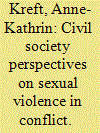

|
|
|
|
|
| Summary/Abstract |
In international policy circles, conflict-related sexual violence (CRSV) is commonly viewed as a weapon of war, a framing that researchers have criticized as overly simplistic. Feminist scholars in particular caution that the ‘weapon of war’ framing decontextualizes sexual violence in conflict from the structural factors of gender inequality that underpin its perpetration. In light of these tensions, how do politically relevant local actors perceive the nature and the origins of conflict-related sexual violence? Civil society organizations often actively confront conflict-related sexual violence on the ground. A better understanding of how their perceptions of this violence align or clash with the globally dominant ‘weapon of war’ narratives therefore has important policy implications. Interviews with representatives of Colombian women's organizations and victims' associations reveal that these civil society activists predominantly view conflict-related sexual violence as the result of patriarchal structures. The mobilized women perceive sexual violence as a very gendered violence that exists on a continuum extending through peace, the everyday and war, and which the presence of arms exacerbates. Strategic sexual violence, too, is understood to ultimately have its basis in patriarchal structures. The findings expose a disconnect between the globally dominant ‘weapon of war’ understanding that is decontextualized from structural factors and a local approach to CRSV that establishes clear linkages to societal gender inequality.
|
|
|
|
|
|
|
|
|
|
|
|
|
|
|
|
| 3 |
ID:
171189
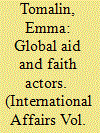

|
|
|
|
|
| Summary/Abstract |
In this article, drawing on the work of the development sociologist Norman Long, I make the case for an actor-oriented approach to understanding the ‘turn to religion’ by global aid actors over the past couple of decades. I ask, is the ‘turn to religion’ evidence of the emergence of post-secular partnerships or are faith actors being instrumentalized to serve neo-liberal development goals? I argue that neither option captures the whole story and advocate that the study of religion and development needs to move beyond a binary between the ‘turn to religion’ as either evidence of post-secular partnerships or of the ‘instrumentalization’ of religion by the secular global aid business, and instead to think about how faith actors themselves encounter and shape development discourses and frameworks, translate them into relevant formats and strategically employ them. Alongside the adoption of an actor-orientated approach, I build on the work of Lewis and Mosse, Olivier de Sardan and Bierschenk to view international faith-based organizations (IFBOs) as development brokers and translators. This approach allows me to articulate the distinctive role that many members of IFBOs report they play as intermediaries who shift register between the secular development language and the faith-inspired language of their local faith partners. I take the engagement of faith actors with the new Sustainable Development Goals framework as a case-study to explore this.
|
|
|
|
|
|
|
|
|
|
|
|
|
|
|
|
| 4 |
ID:
171199
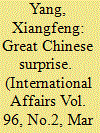

|
|
|
|
|
| Summary/Abstract |
Ample evidence exists that China was caught off guard by the Trump administration's onslaught of punishing acts—the trade war being a prime, but far from the only, example. This article, in addition to contextualizing their earlier optimism about the relations with the United States under President Trump, examines why Chinese leaders and analysts were surprised by the turn of events. It argues that three main factors contributed to the lapse of judgment. First, Chinese officials and analysts grossly misunderstood Donald Trump the individual. By overemphasizing his pragmatism while downplaying his unpredictability, they ended up underprepared for the policies he unleashed. Second, some ingrained Chinese beliefs, manifested in the analogies of the pendulum swing and the ‘bickering couple’, as well as the narrative of the ‘ballast’, lulled officials and scholars into undue optimism about the stability of the broader relationship. Third, analytical and methodological problems as well as political considerations prevented them from fully grasping the strategic shift against China in the US.
|
|
|
|
|
|
|
|
|
|
|
|
|
|
|
|
| 5 |
ID:
171195
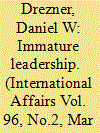

|
|
|
|
|
| Summary/Abstract |
There has been a renaissance in the study of how the backgrounds of individual leaders affect foreign policy outcomes. Donald Trump's presidency highlights the limits of this approach. Trump's psychology is so unique, and so akin to that of a small child, that studying his background alone is insufficient to explain his decision-making. The evidence for this characterization of Trump's leadership comes not from his political opponents, but his allies, staffers and subordinates. Trump's lack of impulse control, short attention span and frequent temper tantrums have all undercut his effectiveness as president as compared to his predecessors. Nonetheless, the 45th president helps to clarify ongoing debates in American politics about the relative strength of the presidency as an institution. In particular, the powers of the presidency have become so enhanced that even comparatively weak and inexperienced leaders can execute dramatic policy shifts. The formal checks on presidential power, from the legislative, judicial and executive branches have all eroded. Similarly, the informal checks on the presidency had also degraded before Trump's inauguration. This article uses Trump's presidency—and his severe limitations as a decision-maker—to highlight the ways in which even a weak leader can affect change by holding a powerful office.
|
|
|
|
|
|
|
|
|
|
|
|
|
|
|
|
| 6 |
ID:
171206
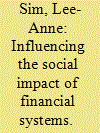

|
|
|
|
|
| Summary/Abstract |
The social impact of the global financial crisis brought global and domestic financial systems into public focus. While over the last ten years governments have introduced a range of regulatory reforms, there are still low levels of public trust in financial sectors, and academics continue to express their concerns about financial systems and their desire for more influence. This is particularly the case for those framing their evaluation of the quality of financial systems in terms of social values. This article offers those seeking more influence over the social values of financial systems, a fresh perspective on their available strategic options for influencing outcomes. It argues that they should consider strategies aimed at making allies of financial sectors and regulators in influencing change. The main advantage of these alliance strategies is that they address key constraints to influence, as identified in existing scholarship, which are difficult to relax because they are tied to features inherent in financial systems. By addressing these constraints, alliance strategies could increase the likelihood that financial system outcomes align more closely with their preferred social values.
|
|
|
|
|
|
|
|
|
|
|
|
|
|
|
|
| 7 |
ID:
171183


|
|
|
| 8 |
ID:
171192
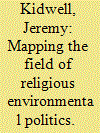

|
|
|
|
|
| Summary/Abstract |
Until fairly recently, consideration of religion has been marginal or even non-existent in the scholarly discourse about environmental politics. Renewed attention to the intersection of these fields has been encouraged by a recent widening in discussions of ‘environmental values’ to include the role of religious institutions and personal belief in forming spiritual environmental values and renewed attention to the place of ethics and religious institutions in global environmental politics. Following a range of historic declarations by religious leaders, the recent encyclical by Pope Francis signalled a new level of integration between Catholic concerns for social and environmental justice. Yet, much of the continued engagement by large environmental NGOs and governments has continued to ignore the complex interrelation of local, intermediate and transnational religious political ecology. In this article, which is based on data gathered during five years of fieldwork, primarily with British Christian REMOs (religious environmental movement organizations), I probe the complexities of political engagement with religious environmentalism which arise from the many different organizational iterations these groups may take. On the basis of such investigation I suggest that effective high-level engagement with REMO groups will be greatly enhanced by a nuanced understanding of the many different shapes that these groups can take, the various scales at which these groups organize, and the unique inflection that political action and group identity can take in a religious context.
|
|
|
|
|
|
|
|
|
|
|
|
|
|
|
|
| 9 |
ID:
171194
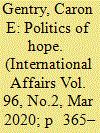

|
|
|
|
|
| Summary/Abstract |
Situated within feminist Christian Realism, this article looks at what political theology is and its relevance to International Relations. Hope is a central theme to political theology, underpinning the necessity to be witness to and to work against oppressive structures. Simply put, hope is the desire to make life better. For Christians, this hope stems from a belief in resurrection of Christ and the faith that such redemption is offered to all of humanity. Hope, however, is not limited to Christianity and, therefore, Christian theology. Thus, taking an intersectional approach, the article looks for similarities in how hope is articulated in three personal narratives: theologian Jürgen Moltmann, UK Muslim advocate Asim Qureshi, and Black Lives Matter co-founder Patrisse Khan-Cullors. Across all three personal narratives, the need for hope begins in a place of despair, signalling a need to recognize that hope and privilege are in tension with one another. Feminist Christian Realism acknowledges and embraces this tension, recognizing that hope cannot function if the pain, oppression and harm caused by privilege are erased or minimized.
|
|
|
|
|
|
|
|
|
|
|
|
|
|
|
|
| 10 |
ID:
171184
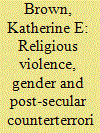

|
|
|
|
|
| Summary/Abstract |
This article argues that despite the framing of religion in the discipline and practice of International Relations (IR) as a force for good, or a cause of evil in the world, IR fails to treat religion on its own terms (as sui generis). With a few exceptions, the discipline has pigeonholed religion as a variable of IR, one that can be discussed as one might GDP, HIV, or numbers of nuclear missiles: measurable, with causality and essential properties. IR has also tended to treat religion as equivalent to features of global politics that it already recognizes—as an institution or community or ideology, for example—but in doing so, it misses intrinsic (and arguably unique) elements of religion. Drawing on feminist insights about how gender works in IR, namely that gender is a construct, performative and structural, this article argues a similar case for religion. A reframing of religion is applied to the case of Daesh (so-called Islamic State of Iraq and Syria, ISIS) to show how our understanding of the organization changes when we view religion differently. The implications for counterterrorism policies if religion is viewed as more than a variable are explored in light of recent territorial and military losses for Daesh. The article therefore proposes a post-secular counterterrorism
|
|
|
|
|
|
|
|
|
|
|
|
|
|
|
|
| 11 |
ID:
171205
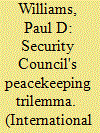

|
|
|
|
|
| Summary/Abstract |
The United Nations (UN) Security Council is stuck in a peacekeeping trilemma. This is a situation where the Council's three strategic goals for peacekeeping operations—implementing broad mandates, minimizing peacekeeper casualties and maximizing cost-effectiveness—cannot be achieved simultaneously. This trilemma stems from longstanding competing pressures on how the Council designs UN peacekeeping operations as well as political divisions between peacekeeping's three key groups of stakeholders: the states that authorize peacekeeping mandates, those that provide most of the personnel and field capabilities, and those that pay the majority of the bill. Fortunately, the most negative consequences of the trilemma can be mitigated and perhaps even transcended altogether. Mitigation would require the Council to champion and implement four main reforms: improving peacekeeper performance, holding peacekeepers accountable for misdeeds, adopting prioritized and sequenced mandates, and strengthening the financial basis for UN peacekeeping. Transcending the trilemma would require a more fundamental reconfiguration of the key stakeholder groups in order to create much greater unity of effort behind a re-envisaged peacekeeping enterprise. This is highly unlikely in the current international political context.
|
|
|
|
|
|
|
|
|
|
|
|
|
|
|
|
| 12 |
ID:
171187


|
|
|
|
|
| Summary/Abstract |
This article explores the role of religion in political transnationalism using the case of the Shi'a Iraqi diaspora since 2003. The article focuses on three areas that capture important trends in Shi'a transnationalism and their implications for transnational Shi'a identity politics. These include Shi'a diasporic politics, transnational Shi'a civic activism, and the cultural production of Iraqi Shi'a identity through pilgrimages, rituals and new practices. It is argued that understanding Shi'a Islam and identity formation requires adopting a transnational lens. The evolution of Shi'a Islam is not only a result of the dictates of the Shi'a clerical centres, and how they influence Shi'a populations abroad, but also the transnational interrelationships and links to holy shrine cities, Shi'i national and international politics, humanitarianism and commemorations and rituals. The article demonstrates that Shi'a political transnationalism is unexceptional in that it echoes much of the literature on diasporic politics and development where diaspora involve themselves from afar in the politics and societies of their countries of origin. At the same time, it shows the exceptionalism of Shi'a diasporic movements, in that their motivations and mobilizations are contributing to the reification of sectarian geographical and social borders, creating a transnationalism that is defined by largely Shi'a networks, spaces, actors and causes. The case of Shi'a political transnationalism towards Iraq shows that this is increasing the distance between Shi'is and Iraq's other communities, simultaneously fragmenting Iraq's national unity while deepening Shi'a identity and politics both nationally and supra-nationally.
|
|
|
|
|
|
|
|
|
|
|
|
|
|
|
|
| 13 |
ID:
171197
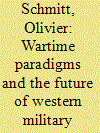

|
|
|
|
|
| Summary/Abstract |
From the perception of the imminence of threats at the political level to the seizing of initiative through proper timing at the tactical level, temporality is directly related to war and warfare. Yet, despite some analyses of the importance of time at the political/grand strategic level (usually by scholars) and at the tactical level (usually by military professionals) there is surprisingly little discussion of the impact of time on the preparation and the conduct of warfare. This article introduces the concept of ‘wartime paradigm’ as a heuristic device to understand the relationship between the perception of time and the conduct of warfare, and argues that after the Cold War, a specific ‘wartime paradigm’ combining an optimization for speed and an understanding of war as risk management has guided western warfare, from force structure to the conduct of actual operations. It shows how the changing character of warfare directly challenges this wartime paradigm and why, if western forces want to prevail in future conflicts, the establishment of a new wartime paradigm guiding technological improvements and operational concepts is critical.
|
|
|
|
|
|
|
|
|
|
|
|
|
|
|
|
|
|
|
|
|